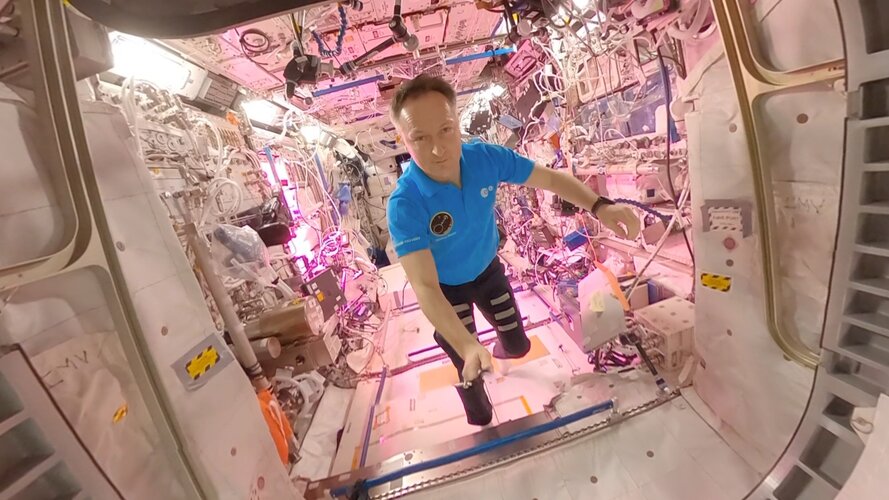
Copernical Team
Columbus, Kibo and a Dragon | Cosmic Kiss 360°
 Video:
00:06:06
Video:
00:06:06
Join ESA astronaut Matthias Maurer on a 360° fly-through of Europe’s Columbus laboratory, Japan’s Kibo Module and the Crew Dragon capsule on the International Space Station.
Matthias has been living and working on the International Space Station for around 100 days, following the launch of Crew-3 from NASA’s Kennedy Space Center in Florida on 11 November 2021. He will spend approximately six months in orbit for his Cosmic Kiss mission. Much of this time is being spent inside the Columbus lab supporting European and international science.
Columbus is ESA’s single largest contribution to the International Space Station and was
Musk donates satellite gear to reconnect Tonga
 Tonga says space entrepreneur and Tesla founder Elon Musk has donated 50 satellite terminals to help the volcano-damaged Pacific island reconnect with the world.
Tonga's telecommunications system has been severely restricted since January 15 when a violent volcanic eruption and tsunami severed its underwater fibre-optic cable.
Musk's Space X corporation is providing 50 very-small-apertu
Tonga says space entrepreneur and Tesla founder Elon Musk has donated 50 satellite terminals to help the volcano-damaged Pacific island reconnect with the world.
Tonga's telecommunications system has been severely restricted since January 15 when a violent volcanic eruption and tsunami severed its underwater fibre-optic cable.
Musk's Space X corporation is providing 50 very-small-apertu NOAA's GOES-T Satellite Road to Launch: Final Preparations
 NOAA's GOES-T, the third in the GOES-R Series of advanced weather observing and environmental monitoring satellites, arrived in Florida on November 10, 2021, to begin final preparations for launch.
GOES-T is scheduled to launch aboard an Atlas V 541 rocket from Space Launch Complex 41 at Cape Canaveral Space Force Station, Florida on March 1, 2022, joining its sister satellite, GOES-16.
NOAA's GOES-T, the third in the GOES-R Series of advanced weather observing and environmental monitoring satellites, arrived in Florida on November 10, 2021, to begin final preparations for launch.
GOES-T is scheduled to launch aboard an Atlas V 541 rocket from Space Launch Complex 41 at Cape Canaveral Space Force Station, Florida on March 1, 2022, joining its sister satellite, GOES-16. NRAO and Optisys Partner Up to Produce 3D Devices for Radio Astronomy
 Recent advancements in 3D printing (also known as additive manufacturing) for metallic structures make it possible to print all-metal electromagnetic devices-like antennas and waveguides-on demand. A new partnership between the National Radio Astronomy Observatory, headquartered in Charlottesville, Virginia, and Optisys, LLC, headquartered in West Valley City, Utah, will explore the potential fo
Recent advancements in 3D printing (also known as additive manufacturing) for metallic structures make it possible to print all-metal electromagnetic devices-like antennas and waveguides-on demand. A new partnership between the National Radio Astronomy Observatory, headquartered in Charlottesville, Virginia, and Optisys, LLC, headquartered in West Valley City, Utah, will explore the potential fo Fingerprinting minerals to better understand how they are affected by meteorite collisions
 When a space rock survives the turbulent passage through Earth's atmosphere and strikes the surface, it generates shockwaves that can compress and transform minerals in the planet's crust. Since these changes depend on the pressure produced upon impact, experts can use features in Earth's minerals to learn about the meteorite's life story, from the moment of collision all the way back to the con
When a space rock survives the turbulent passage through Earth's atmosphere and strikes the surface, it generates shockwaves that can compress and transform minerals in the planet's crust. Since these changes depend on the pressure produced upon impact, experts can use features in Earth's minerals to learn about the meteorite's life story, from the moment of collision all the way back to the con Northrop Grumman launches cargo ship to International Space Station
 A fresh supply of 8,300 pounds of scientific investigations and cargo launched from NASA's Wallops Flight Facility in Virginia at 12:40 p.m. EST on Saturday, Feb. 19, aboard a Northrop Grumman Cygnus resupply spacecraft, and is now traveling to the International Space Station.
The Cygnus spacecraft, which was launched on an Antares rocket, is scheduled to arrive at the space station around
A fresh supply of 8,300 pounds of scientific investigations and cargo launched from NASA's Wallops Flight Facility in Virginia at 12:40 p.m. EST on Saturday, Feb. 19, aboard a Northrop Grumman Cygnus resupply spacecraft, and is now traveling to the International Space Station.
The Cygnus spacecraft, which was launched on an Antares rocket, is scheduled to arrive at the space station around China's Chang'e-4 discovers glass globules on far side of moon
 The Yutu-2 lunar rover of China's Chang'e-4 mission has discovered two macroscopic translucent glass globules during its exploration of the far side of the moon, which could potentially help reveal the moon's early impact history.
According to a study published in Science Bulletin, the Yutu-2 rover captured images of two translucent globules using its panoramic camera.
No composition
The Yutu-2 lunar rover of China's Chang'e-4 mission has discovered two macroscopic translucent glass globules during its exploration of the far side of the moon, which could potentially help reveal the moon's early impact history.
According to a study published in Science Bulletin, the Yutu-2 rover captured images of two translucent globules using its panoramic camera.
No composition Brains of cosmonauts get 'rewired' to adapt to long-term space missions, study finds
 A new study published in Frontiers in Neural Circuits is the first to analyze the structural connectivity changes that happen in the brain after long-duration spaceflight. The results show significant microstructural changes in several white matter tracts such as the sensorimotor tracts. The study can form a basis for future research into the full scope of brain changes during human space explor
A new study published in Frontiers in Neural Circuits is the first to analyze the structural connectivity changes that happen in the brain after long-duration spaceflight. The results show significant microstructural changes in several white matter tracts such as the sensorimotor tracts. The study can form a basis for future research into the full scope of brain changes during human space explor A Sol in the Life of a Rover
 What does Percy do all day? A Martian day- or Sol- is 24 hours and 37 minutes long, and while every Sol is different, each one is packed full of exciting science activities, observations, and discoveries! Let's follow Percy on Sol 345 (February 8th, 2022) to catch a glimpse into the daily life of a Martian explorer.
Percy woke up early in the morning at 02:07 LMST (Local Mean Solar Time on
What does Percy do all day? A Martian day- or Sol- is 24 hours and 37 minutes long, and while every Sol is different, each one is packed full of exciting science activities, observations, and discoveries! Let's follow Percy on Sol 345 (February 8th, 2022) to catch a glimpse into the daily life of a Martian explorer.
Percy woke up early in the morning at 02:07 LMST (Local Mean Solar Time on Webb team brings 18 dots of starlight into hexagonal formation

The James Webb Space Telescope team continues to make progress in aligning the observatory's mirrors. Engineers have completed the first stage in this process, called "Segment Image Identification." The resulting image shows that the team has moved each of Webb's 18 primary mirror segments to bring 18 unfocused copies of a single star into a planned hexagonal formation.
With the image array complete, the team has now begun the second phase of alignment: "Segment Alignment." During this stage, the team will correct large positioning errors of the mirror segments and update the alignment of the secondary mirror, making each individual dot of starlight more focused.
